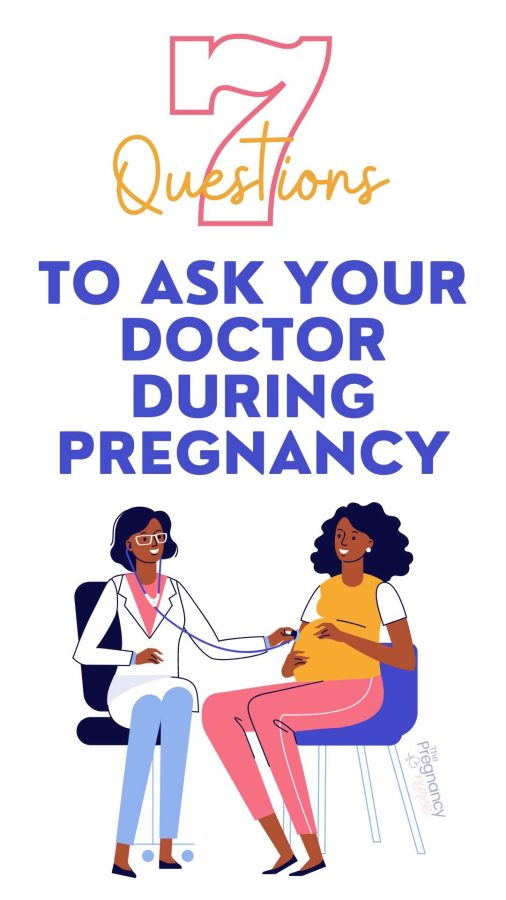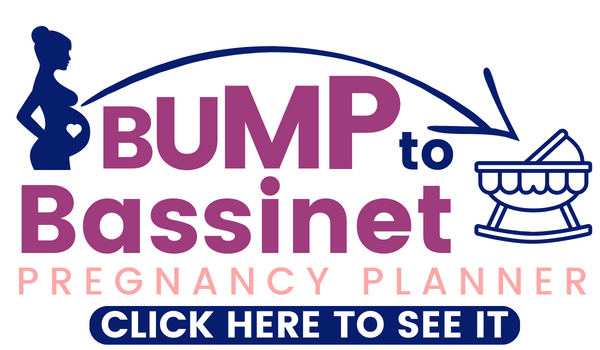Talking with your provider is important, but talking with them about the IMPORTANT things is imperative during your pregnancy. You may have a lot of questions, and those are AOK to ask, but these are ones that sometimes you forget to ask your doctor and really need to know the answers to.

But first off, how am I a good resource for these questions?
Hi — I’m Hilary — The Pregnancy Nurse 👩⚕️. I have been a nurse since 1997 and I have 20 years of OB nursing experience, I am also the curly head behind Pulling Curls and The Online Prenatal Class for Couples. 🩺 I have talked with countless patients about their provider and helping them get the answers they need to these questions. Much of this may not come-up as an issue until later in your pregnancy, but having the answers now will give you a firm foundation.
Communication is key to ANY relationship, but with your provider it’s even more important than you imagine. As a nurse, I have watched a LOT of doctor/patient relationships and I’ve talked with patients who did NOT know the answer to these important questions (which led them to a needless labor and delivery stop which can be time-consuming and possibly very expensive). So, asking them at your next prenatal appointments is important.
The Most Important Question to Ask Your OBGYN When Pregnant
How to get hold of them when their office is not open. The thing is pregnancy and obstetrics is a 24/7 thing, and providers most often have someone that takes calls for them 24/7. The person who takes calls can be:
- Them (some doctors take their own calls)
- Someone in their office (another OB, Midwife PA or NP)
- A triage nurse
Often you will get the recording that their office is now closed, but somewhere in that recording they should have something that says “if this is an emergency, please call XYZ” and will direct you to an answering service who will probably page the person on call for you and they will call you back.
Some doctors will give you their cell phone number, and some doctors have no one on and expect you to just go to labor and delivery — so ask your provider what their method of contact is during your pregnancy care.
Before we get too far into this, go ahead and grab my pregnancy planner. It gives you pages to write down these questions, and other things to keep track of (to let you brain REST sometimes).
Your Pre-Appointment Questions
Before you even see your doctor, there are (of course) some things to ask yourself when picking a provider.
- Are they on your insurance — super important, I actually recommend starting your search in your insurance booklet so you don’t get your heart set on someone who you would have to pay an arm and a leg for
- How far away is this provider — visits will be frequent at the end, so having a provider that is far away can be problematic (but possibly also worth it if you really like them)
- Recommendations — reviews on doctors online are not a great way to gauge what kind of a doctor they are. I’d ask friends who’ve seen providers in your area and get an idea of who you’d “match” well with (and if you have a nurse or a labor nurse in your circle of friends that is a GREAT place to start.
A Note On Your First Prenatal Visit
I am guessing that a good amount of you have already had that first prenatal visit, and you may even be headed into your second trimester (or later) when you’re reading this article. Don’t worry, you didn’t need to get all this “done” early in prenatal care. You can talk to your doctor about these questions at any visit, and some of them you may want to ask at every visit, especially if anything about your condition changes.

Ok, let’s go on to those other important questions to ask your provider:
Who Sees Their Patients When They’re Not Around?
Providers go on vacation, they go to conferences, and they also get sick. They should have a plan in place for who sees their patients when they are not in.
Now, if you are in a large practice, you may have seen several providers during your pregnancy — so it makes sense that you’ll just see one of those. BUT, if you’re in a smaller practice you’ll want to know this one. Who will see you for prenatal care if they’re not in town (they may just schedule your visits around their holiday), who will see you in the hospital, and obviously who can you get in touch with after the office is closed like we talked about above.
What is Their C-Section Rate
The thing is, you only mildly actually care what their c-section rate is (most doctor’s c-sections rate is going to hover between 25-33%). But I can tell you that every provider knows approximately what their cesarean rate is (often, the hospital will review it with them if it increases or congratulate them if it decreases). But, you’re really getting an idea of how open they are to communicating with you about how they practice.
If they’re defensive and say they don’t know, that can sometimes be a red flag that your provider wants to do things their way and aren’t interested in direct communication with you.
BTW, if you want to know about some other red flags, come join my pregnancy newsletter:
How Do They Feel About Birth Plans
This is another one that you’re just sort of testing the waters.
If your provider gets defensive about birth plans and says that they will make the plan for you, that’s a red flag.
If they say they love birth plans, but they prefer birth preferences and they want to remind you that birth can be unpredictable, but that they want to support you in what you wan that’s a good answer.
Let me state categorically, no provider can accomplish the “tasks” on your birth plan. That’s not their job. Their job is to hear what you’re hoping for and then to try to achieve those things, while your body, baby and mother nature may have other plans.
Pro Tip: After you ask these questions you may think that you want a different provider. I can’t more strongly suggest you firm-up your provider by about 30 weeks. Many providers are reticent to take on new patients after this timeframe due to liability. You can still switch, just start looking for other recommendations asap. I have a whole post on breaking up with your OB.
And, if you’re wanting to keep your birth plan in mind, come join me in my free beginning prenatal class to get started on it.
Are there Things You Should NOT Be Doing?
This one is really important if your condition changes. If you start to have early contractions, what should you not be doing at this point…. other things might be:
- Standing for too long
- Penetrative sex
- Any type of sex
- Taking care of pets
- Things you should avoid eating
In general this isn’t really an important question until you’re a bit further along. Most often you can carry-on with the activities you have previously been doing, but sometimes things happen that chance what you can do and you should be alert to those things. This is also important because activities that are safe during pregnancy may vary person to person due to their medical history or pregnancy needs.
What Medications Can You Take for Common Ailments?
One of the BIGGEST issues is when something happens (you get a headache, a cold, or have a fever) and you have no idea what you can take (or not take) to help yourself during that situation. Most providers have a list of medications they think are OK so be sure to get that early on so you don’t have to bother them after office hours. If you’re currently taking medications be sure to check with your doctor if they’re OK (and when you should stop taking it).
Pro tip: This also includes over-the-counter medications, not just prescription medications. Many medications that are commonly taken can cause big pregnancy complications.
What Hospital(s) Do They Deliver At?
First off, it’s important to know if your provider that you are seeing will be the one to deliver you. Often people see a PA (physicians assistant) or an NP (nurse practitioner) in the office, and those people do not deliver babies. Only a Doctor or a Certified Nurse Midwife can deliver babies in the hospital setting. BUT people get surprised that the person they’ve seen for all their prenatal care is not the one that will deliver them, so that’s nice to know ahead of time (you may be able to schedule at least one of your visits with a delivering provider just so you can have a heads up on who they will be).
But, beyond that providers only deliver at 1-2 hospitals. It takes a lot to keep “privilege’s” up at each hospital and it can be hard to see patients at multiple hospitals. SO, ask what hospital you should be planning to deliver at (and also make sure that they’re on your insurance).
Beyond these important questions here are a few more by each trimester:
** This list is by no means exhaustive. It’s just some ideas to get started on your own list. I always recommend keeping a running list of questions to ask your doctor in your phone in your notes app.
First Trimester Doctor Questions:
As a reminder your first trimester goes from when you got pregnant til’ about 13 weeks.
- What prenatal vitamin is best for you
- Another other vitamins or medications you should be taking?
- How many appointments will you likely have with them
- What to do if you need to reschedule an appointment
- What type of lab work are they doing or have done and what does it mean?
- How much is too much throwing up (if you have morning sickness) and what should you do if you get to that point?
- Mention any problems you’re having (constipation, difficulty sleeping, etc) and if they have any ideas for you
- If they recommend you seeing any other practitioners (physical therapy, chiropractor etc).
- Where do you go if you have an emergency (bleeding, etc)
- What are problem signs you should be watching for at this point?
- When is your due date (and how accurate they think it is)
- Anything you should NOT be eating
- How will payment work?
Second Trimester Doctor Questions
Your second trimester is from about 14 weeks through 27 weeks
- Where to go if you have an emergency (often this changes from the emergency room to labor and delivery during this timeframe)?
- What are problem signs to watch for?
- When will you have your next ultrasound (and where will it be)
- What type of lab work do you have coming up, and what is it for?
- Do they have any exercise routines they recommend?
- What type of prenatal education do they recommend?
- Any tips on good nutrition for you during this pregnancy?
- If you’re Rh Negative (your blood type), when will you get your Rhogam shot?
- Any tips for any ailments you have going on (not sleeping, pain in certain areas of your body)
- Any medications you should start/stop at this point?
- If you’re planning on a doula, ask them if they have any they like or recommend
Third Trimester Doctor Questions
Third trimester questions vary a lot than first and second trimester questions more depending on any high-risk pregnancy issues that you might have:
- Do you foresee a vaginal delivery for me?
- How many contractions are OK in an hour (and when is premature birth no longer a concern)
- Could a maternity belt help you feel better (and how/when should you wear it)?
- If you’re looking, do they have a pediatrician they recommend (baby’s doctor)
- Do they see any reasons you might have a c-section?
- Any ideas on how to prep to breastfeed
- Any activities you shouldn’t be involved in any more (especially at work), or when should you be done working?
- Any medications to add/remove at this time?
- Are they out of town during this time frame?
- What types of birth control options will be available after birth?
- What will your postpartum care look like from them?
- Will you have another ultrasound?
- Is your amount of weight gain (vs your pre-pregnancy weight) in line with what they’d recommend?
- Do you have gestational diabetes, and if not do they have any nutritional recommendations for you?
- Where should you go if you have a problem
- Are there other providers (physical therapy, chiropractor) that they recommend for a more comfortalbe pregnancy?
- What types of problems would warrant a call vs going into labor and delivery?
- Is the baby growing well? Any issues that they are seeing?
- How are your other vital signs (especially high blood pressure), should you monitor it at home as well?
- Do they have tips for your delivery facility?
- Firm up your doula plans with them
- Review your birth
planpreferences with them, discuss anything that could be an issue with what their “normal” practice is - Discuss your pain management options during labor
- Do they plan on offering an induction (or do they see a reason you’ll need one)
Again, keep thinking of questions that you have in your own mind and keep them on your notes app — these are only meant to jog your memory of what’s important to you.
I hope this gave you some ideas of what to chat about with the medical professionals you see during your prenatal care. Learning to talk with healthcare providers is an important step for your own healthcare needs, but also learning to take care of a little one and their individual needs as well.
If you’re looking to get prepared for birth, come join me in The Online Prenatal Class for Couples where we help you feel prepared for birth in just a few hours.
And, if you’re not quite sure you’re ready for that whole thing, check out my free prenatal class. It’s your first step toward getting in the driver’s seat of your birth.






 Cramping at 24 Weeks Pregnant
Cramping at 24 Weeks Pregnant
